May 30, 2025 | 21:03 GMT +7
May 30, 2025 | 21:03 GMT +7
Hotline: 0913.378.918
May 30, 2025 | 21:03 GMT +7
Hotline: 0913.378.918
The Southern Office (National Agricultural Extension Center) recently collaborated with the Agricultural Extension Center of Kien Giang and Phuong Nam Agricultural Development Co., Ltd. to conduct a workshop assessing a model for directly processing rice straw into fertilizer. The model was based on using Crowel M+ organic fertilizer in conjunction with the SUMITRI microbial product. This model was utilized on a five-hectare scale at Vinh Phu Agricultural Cooperative (Kien Giang province) during the summer-autumn rice crop 2024, utilizing the OM18 rice variety.
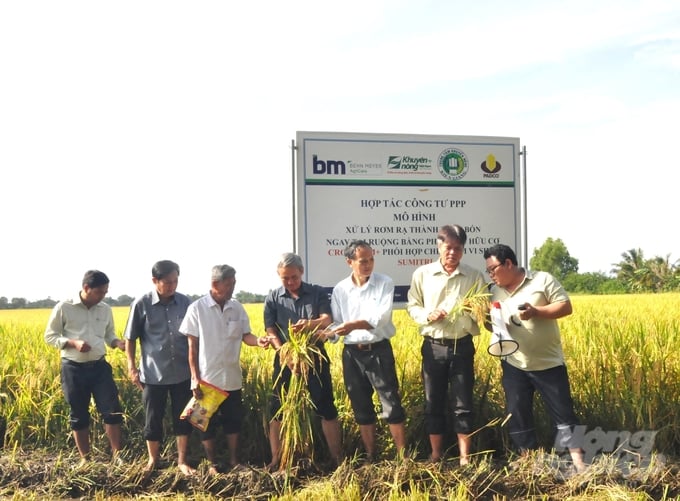
The model of processing straw into fertilizer right in the field using organic fertilizer Crowel M+ combined with SUMITRI microbiological product in Vinh Phu commune (Giong Rieng district) is very useful and highly effective. Photo: Trung Chanh.
Vinh Phu is a region that specializes in double-crop rice cultivation. Farmers frequently encounter challenges when managing rice straw after harvest, which can result in organic poisoning. Furthermore, the soil is further degraded, yield and economic efficacy are impacted, and environmental pollution is caused by the burning of rice straw to clean fields.
The SUMITRI microbial product model has facilitated the rapid processing of rice straw in the field, thereby establishing an organic fertilizer source that enhances the efficacy of rice production and adds nutrients to the soil. Farmers processed the rice stalks with SUMITRI at a dosage of 3 kg/ha following the 2023-2024 winter-spring rice crop harvest (sold at 200,000 VND/kg). The rice straw had decomposed to approximately 70-80% after 15 days of treatment, thereby establishing itself as an organic source for the fields.
According to Mr. Pham Xuan Hung, Director of Phuong Nam Agricultural Development Co., Ltd., which manufactures and distributes the SUMITRI microbial product, each kilogram of treated rice chaff can produce approximately 0.6 kg of organic fertilizer. Approximately 8 tons of straw are left in the field after each hectare of rice is harvested. This straw, when processed, provides nearly 5 tons of organic fertilizer to enrich the soil. This allows producers to decrease their use of chemical fertilizers by approximately 30% and their pesticide applications by 2-3 times as a result of a decrease in outbreaks of pests.
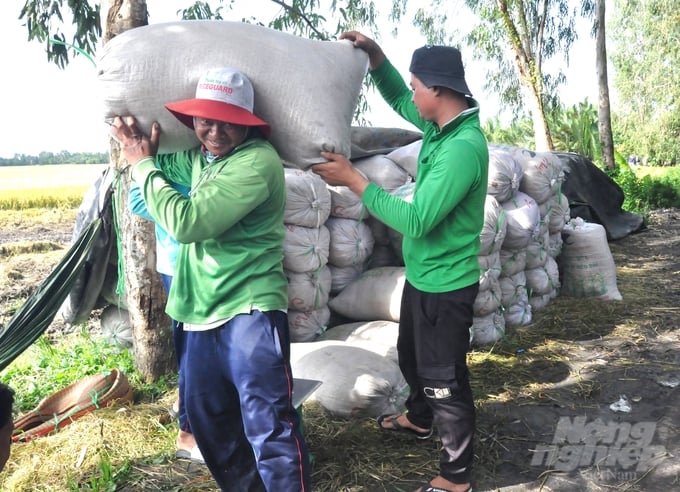
Thanks to the application of SUMITRI microbial products to treat straw and add organic nutrients to the soil, Vinh Phu farmers had a successful summer-autumn rice crop, achieving the highest profits. Photo: Trung Chanh.
The farmers have experienced immense satisfaction due to the 2024 summer-autumn rice crop. Field visits revealed a substantial distinction between fields treated with the SUMITRI microbial product and untreated fields. The former exhibited a robust growth of rice plants, with a greater number of tillers, larger panicles, and brilliant yellow grains. Additionally, the plants did not lodge, which facilitated mechanical harvesting.
Mr. Du Van Kieu, Director of Vinh Phu Agricultural Cooperative, reported with satisfaction that the rice yield in fields treated with SUMITRI microbial product reached 7.2 tons/ha (fresh rice harvested by machine). Additionally, fields supplemented with organic fertilizer yielded 8.5 tons/ha, while the control fields yielded 7.2 tons/ha.
The model fields' production costs were 20 and 18.5 million VND/ha, respectively, as a result of the reduced use of chemical fertilizers and pesticides. In contrast, the control fields cost 22.2 million VND/ha. After deducting costs, the model fields generated profits of 40 and nearly 47 million VND/ha, respectively, with the OM18 rice variety selling at 7,700 VND/kg to field merchants. Conversely, the control fields generated profits of only nearly 33.2 million VND/ha.
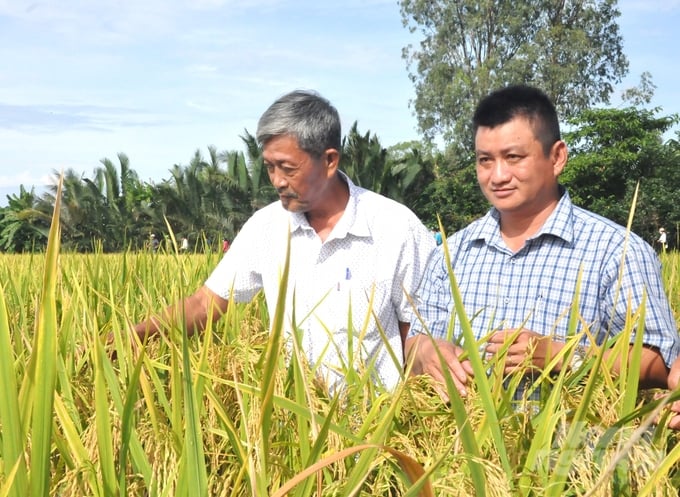
The model of treating straw in the field with SUMITRI microbial products has provided organic matter to the soil, helping rice grow well with fewer pests and diseases, reducing costs, and achieving high productivity. Photo: Trung Chanh.
Mr. Nguyen Van Kia, a Vinh Phu Agricultural Cooperative member, stated, "We farmers have come to the realization that the sale of straw is akin to the sale of blood, and the burning of straw in the fields is akin to the burning of money. Nevertheless, we were compelled to destroy it as a result of the absence of effective processing methods, which is quite distressing".
After utilizing the SUMITRI microbial product to rapidly process rice chaff in the field, converting it into organic fertilizer that enriches the soil, the results were evident after one rice crop. Harvest yields increased, production costs decreased, and profits were substantial. Consequently, Mr. Kia and numerous other members expressed their interest in purchasing and utilizing the SUMITRI microbial product to process refuse, as opposed to burning it as they had previously done.
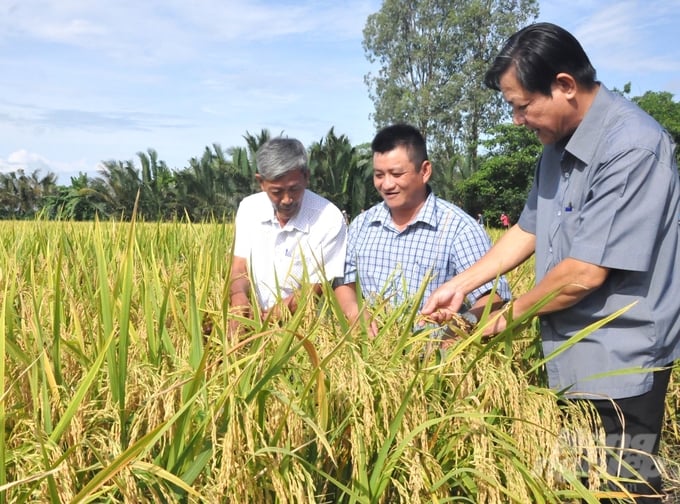
Deputy Director of Kien Giang Agricultural Extension Center - Mr. Nguyen Van Hien (right cover) and farmers evaluate the effectiveness of the model of treating straw in the field with SUMITRI biological product. Photo: Trung Chanh.
Nearly 47,000 hectares of rice cultivation are located in Giong Rieng, a district in the western region of the Hau River. The district is divided into three sub-regions. A well-developed irrigation system, year-round access to fresh water, and fertile land with alluvial deposits characterize the region. Consequently, it has the potential to support intensive rice cultivation with three crops per year. Giong Rieng had intended to cultivate 25,000 hectares for the autumn-winter rice crop of 2024; however, it has already surpassed 31,000 hectares.
According to Mr. Le Van Chi, the Deputy Head of the Department of Agriculture and Rural Development of Giong Rieng district, the sub-regions that produce three crops annually are precisely the same as the area sowed for the autumn-winter rice crop. The farmers are under pressure to manage rice straw, so they choose to burn it as a solution, as the interval between crops is brief due to the three rice crops harvested annually. Nevertheless, farmers encounter processing challenges during the rainy season, as they are compelled to plow and soak the straw in water, resulting in environmental pollution. The afterward rice crop is subjected to organic poisoning due to the natural, gradual decomposition of straw.
The practicable model of utilizing the SUMITRI microbial product to process rice straw rapidly in the field in Vinh Phu has been demonstrated to be an effective and beneficial solution, as per Mr. Chi. He recommends that this solution be expanded and that farmers in the district be encouraged to implement it.
Additionally, the Giong Rieng district has implemented policies to assist producers in implementing an organic rice production plan. In addition, the district actively participates in a project that aims to cultivate one million hectares of specialized, high-quality, low-emission rice in the Mekong Delta in conjunction with green development by 2030. Consequently, the reduction of greenhouse gas emissions necessitates the implementation of efficient straw processing solutions.
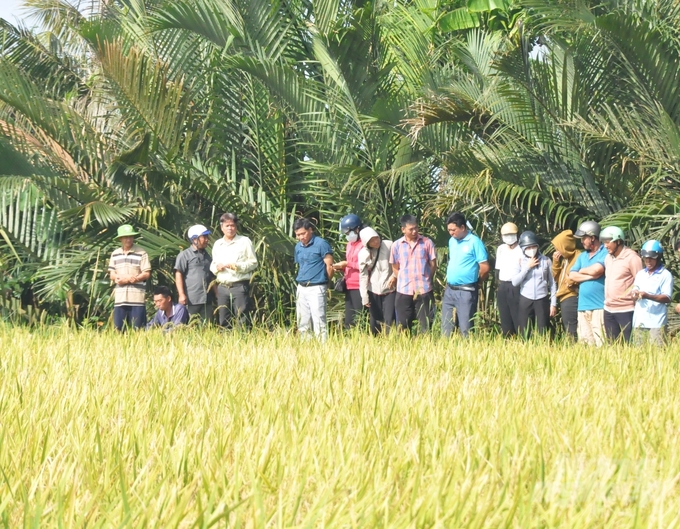
The model of treating straw in the field with SUMITRI microbial products helps reduce environmental pollution, reduce greenhouse gas emissions, increase rice production efficiency, and increase farmers' income. Photo: Trung Chanh.
Mr. Nguyen Van Hien, the Deputy Director of the Kien Giang Agricultural Extension Center, observed that the agricultural sector has transitioned from production to agricultural economics and responsible farming. To establish the agricultural value chain, farmers must engage in production linkages through farmer organizations to ensure that they have large enough areas, consistent processes, and a sufficient volume of goods to satisfy the demands of the business.
Consequently, producers must adhere to the recommended production processes and participate in technical training sessions conducted by the agricultural sector and extension officers. They must abandon antiquated production methods detrimental to the environment, such as burning fields or plowing and submerging straw in water for natural decomposition. Farmers should maintain production records to determine the efficiency and profitability of each crop and to account for costs.
One necessary condition for the one million hectares of high-quality rice project is the removal of straw from the fields. This straw can be used to cultivate mushrooms, produce animal feed, or be processed directly into organic fertilizer in the field using effective microbial solutions that do not increase greenhouse gas emissions. Thus, the SUMITRI microbial product-based paradigm for rapidly processing rice straw in the field is a novel approach that necessitates technical training for farmers to be effectively implemented.
Translated by Linh Linh

(VAN) Vaccinating juvenile pangasius helps reduce disease, antibiotic use, and farming costs, increasing profits for export-oriented farmers in An Giang.

(VAN) Due to a limited supply of workforce and competitive recruitment requirements, businesses struggle to retain talented veterinary human resources.

(VAN) WOAH’s guidance aims to mitigate disease risks through a One Health approach that balances economic, conservation, and public health interests.

(VAN) Ms. Nguyen Thi Dung, Deputy Director of Ngoc Hoang Cooperative, shared about the journey of bringing dragon fruit to Europe, achieving annual revenues in the billions of VND.

(VAN) Bamboo products from Thang Tho Bamboo Cooperative have reached many countries around the world, while also creating jobs for local workers.

(VAN) The Management Board of Con Dao National Park reported that a green sea turtle, tagged in the Philippines, has traveled thousands of kilometers to lay 84 eggs on Bay Canh Islet.

(VAN) Green technology is paving a new path for sustainable aquaculture in the Mekong Delta in particular and across the country in general, helping reduce emissions and adapt to climate change.